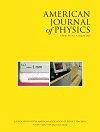Galilean relativity and the path integral formalism in quantum mechanics
IF 0.9
4区 教育学
Q3 EDUCATION, SCIENTIFIC DISCIPLINES
引用次数: 0
Abstract
Closed systems in Newtonian mechanics obey the principle of Galilean relativity. However, the usual Lagrangian for Newtonian mechanics, formed from the difference of kinetic and potential energies, is not invariant under the full group of Galilean transformations. In quantum mechanics, Galilean boosts require a non-trivial transformation rule for the wave function and a concomitant “projective representation” of the Galilean symmetry group. Using Feynman's path integral formalism, this latter result can be shown to be equivalent to the non-invariance of the Lagrangian. Thus, using path integral methods, the representation of certain symmetry groups in quantum mechanics can be simply understood in terms of the transformation properties of the classical Lagrangian and conversely. The main results reported here should be accessible to students and teachers of physics—particularly classical mechanics, quantum mechanics, and mathematical physics—at the advanced undergraduate and beginning graduate levels, providing a useful exposition for those wanting to explore topics such as the path integral formalism for quantum mechanics, relativity principles, Lagrangian mechanics, and representations of symmetries in classical and quantum mechanics.伽利略相对论与量子力学中的路径积分形式
牛顿力学中的封闭系统遵循伽利略相对性原理。然而,牛顿力学中由动能和势能之差形成的拉格朗日,在全组伽利略变换下不是不变的。在量子力学中,伽利略推进需要波函数的非平凡变换规则和伴随的伽利略对称群的“投影表示”。利用费曼路径积分的形式,可以证明后一个结果等价于拉格朗日量的非不变性。因此,使用路径积分方法,量子力学中某些对称群的表示可以简单地根据经典拉格朗日的变换性质来理解,反之亦然。这里报告的主要结果应该对物理学的学生和教师——特别是经典力学、量子力学和数学物理——在高级本科和研究生阶段的学生和教师开放,为那些想要探索量子力学的路径积分形式、相对性原理、拉格朗日力学以及经典和量子力学中的对称性表示等主题提供有用的阐述。
本文章由计算机程序翻译,如有差异,请以英文原文为准。
求助全文
约1分钟内获得全文
求助全文
来源期刊

American Journal of Physics
物理-物理:综合
CiteScore
1.80
自引率
11.10%
发文量
146
审稿时长
3 months
期刊介绍:
The mission of the American Journal of Physics (AJP) is to publish articles on the educational and cultural aspects of physics that are useful, interesting, and accessible to a diverse audience of physics students, educators, and researchers. Our audience generally reads outside their specialties to broaden their understanding of physics and to expand and enhance their pedagogical toolkits at the undergraduate and graduate levels.
 求助内容:
求助内容: 应助结果提醒方式:
应助结果提醒方式:


